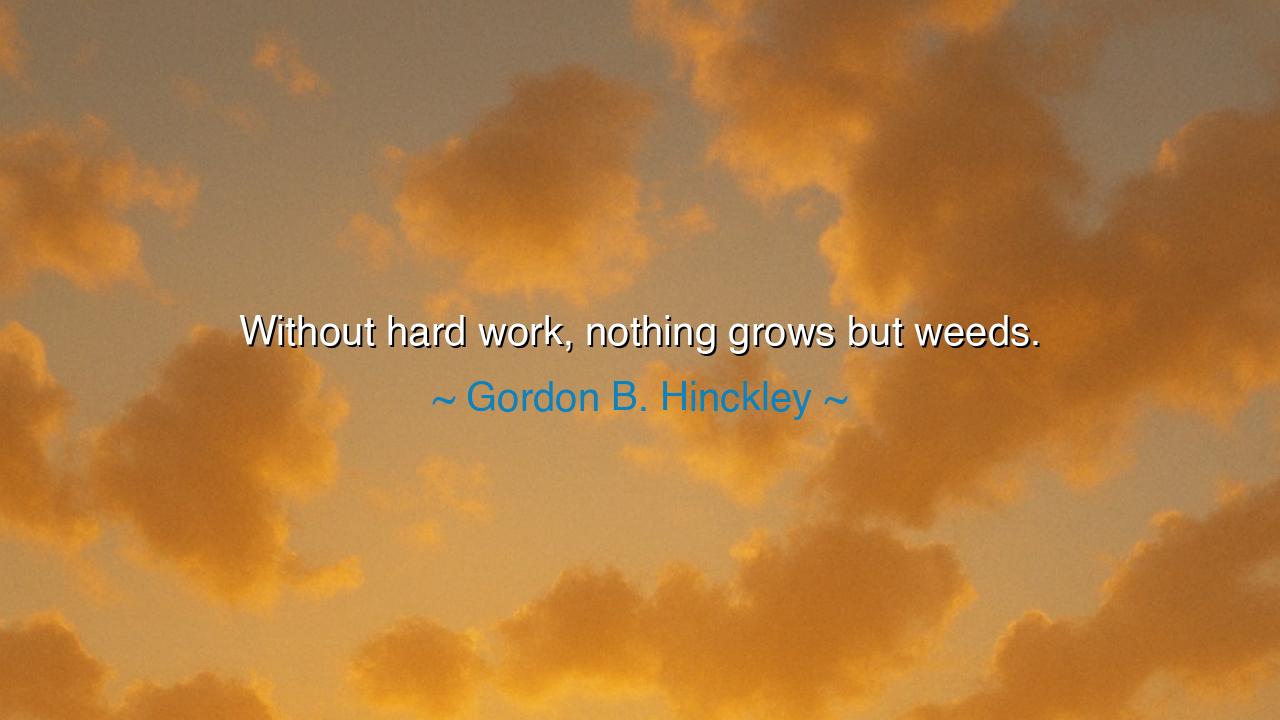
Without hard work, nothing grows but weeds.






Gordon B. Hinckley, a voice of faith and discipline, once declared: “Without hard work, nothing grows but weeds.” These words carry the timeless wisdom of the soil, where the laws of life and labor are revealed to those who have eyes to see. A field left untended does not remain empty; it becomes overrun with weeds. So too with the soul, the mind, or the work of human hands—if not cultivated with care, effort, and discipline, chaos and decay will surely take their place.
The meaning is both simple and eternal: hard work is the price of growth. Nothing noble, nothing lasting, nothing fruitful comes without it. Dreams alone are barren. Good intentions alone bear no harvest. If one desires abundance—whether in crops, knowledge, virtue, or achievement—he must labor for it. The earth teaches this law plainly: only the farmer who sweats beneath the sun, plowing and planting, reaps a harvest. The idle one, who sits and waits, finds his field filled only with thorns.
History gives us a clear witness. Consider the rise of George Washington Carver, born into slavery, raised in poverty, yet determined to learn. He worked tirelessly for knowledge, often walking miles to attend school, studying by candlelight, and dedicating his life to science. His hard work transformed agriculture, bringing new life to impoverished soils through the peanut and crop rotation. Had he waited for opportunity without labor, his fields would have borne only weeds. But because he worked, his life bore fruit that nourished generations.
The ancients too understood this law. In Rome, the great general Cincinnatus left his plow in the fields to defend the Republic, then returned to it after victory. His life itself was a testimony: greatness is built upon labor, and the cultivation of the land mirrored the cultivation of character. The Romans believed that discipline in the fields created discipline in the heart, and that without toil, both soil and spirit fell to ruin.
Hinckley’s words also warn against complacency. Many desire success but despise the effort it demands. They long for the harvest without sowing, for strength without training, for wisdom without study. But nature does not allow such shortcuts. Where work is absent, decline is inevitable. The weeds of laziness, distraction, and decay grow quickly, choking out the seeds of greatness. Thus, the only cure is to labor daily, pulling the weeds and tending the garden of life with diligence.
The lesson is clear: if you would see growth—in your life, in your work, in your relationships—you must embrace hard work. Do not fear it, for it is the tool that shapes all good things. Treat your life as a garden: sow seeds of effort, water them with persistence, and protect them from the weeds of idleness. In time, you will reap abundance.
So I say to you, children of tomorrow: remember the law of the soil. “Without hard work, nothing grows but weeds.” Do not let your life become overgrown with neglect. Work diligently at your dreams, your craft, your character, your service to others. Let each day be a tending of your field, and in the harvest of years, you will find not weeds, but fruit worthy of remembrance.
If you would live this truth, begin today by examining your field. What weeds of idleness or neglect have crept in? Pull them out by action. Replace them with the seeds of discipline, the habits of effort. Work faithfully, even when no fruit is yet seen. For in due season, the harvest will come, and it will testify that your labor was not in vain.






AAdministratorAdministrator
Welcome, honored guests. Please leave a comment, we will respond soon